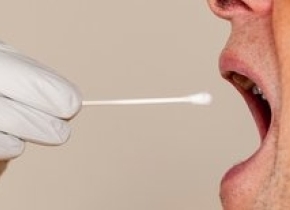
唾液蛋白质可能会抑制肠道紊乱
在实验室里,一种于唾液中发现的蛋白质可以防止害虫与肠细胞结合,这为我们提供了一种降低患上痢疾可能性的方法。克里斯托弗·因塔利亚塔报道。
撰文/播音:克里斯托弗·因塔利亚塔(Christopher Intagliata)
翻译:姜帆
审校:郭晓
Every day, you produce one to two liters of spit. It kick-starts digestion and helps you swallow. And it helps prevent bacterial infection in your mouth.
每天,你都会产生一到两升的唾液。它启动消化并帮助你吞咽。而且它还有助于防止口腔内细菌感染。
"But that still seemed like a lot of energy put into something if it's only going to do that small task." Esther Bullitt, a biophysicist at the Boston University School of Medicine. "And we wondered whether there was something else it was doing as well, if maybe it had a farther reach than just preventing infections in the mouth."
“但是,如果只有那么一点用处,那么唾液似乎有点大材小用了。”波士顿大学医学院生物物理学家艾斯特·布利特(Esther Bullitt)说道。“我们想知道它是否还有其他功能,或许它除了预防口腔感染外还有更多的作用。”
So she and her team looked farther down the pipes—at whether certain proteins in spit might also disrupt the work of bad bugs in the gut. They grew cells taken from the small intestine of a 51-year-old woman. They also grew a batch of pathogenic E. coli bacteria, the kind that cause traveler's diarrhea. The E. coli have hairlike extensions, called pili, that grab onto the intestinal cells. But fewer of the E. coli were able to successfully attach to the intestinal cells when a particular saliva protein, called histatin-5, was hanging around.
因此,她和她的团队对唾液进行了进一步的研究——唾液中的某些蛋白质是否也可能阻止肠道中有害细菌的破坏作用。他们培养了从一名51岁女性的小肠中获取的细胞。他们还培养了一批致病性大肠杆菌,这种细菌会导致旅行者腹泻。大肠杆菌具有毛状突起,称为菌毛,菌毛能抓住肠细胞。但是当有特定的唾液蛋白组氨素抑制素-5在其周围时,能够成功附着在肠细胞上的大肠杆菌数量将减少。
You can think of the E. coli like pirate ships, trying to dock at a port. What the histatin-5 does is stop the pirate ships, the bad bugs, from using their ropes—the pili—to dock. "If you can't bind, then you can't start an infection. So no adhesion, no infection, no disease."
你可以把大肠杆菌想象成海盗船,它们试图停靠在一个港口。组氨素抑制素-5所做的是阻止海盗船(有害细菌),使用它们的绳索——菌毛——到达码头。“如果大肠杆菌不能与肠细胞结合,那么它们就无法进行感染。所以没有粘连,就没有感染,也就没有疾病。”
The study is in The Journal of Infectious Diseases. [Jeffrey W. Brown et al., A Role for Salivary Peptides in the Innate Defense Against Enterotoxigenic Escherichia coli]
这项研究发表于《传染病杂志》(The Journal of Infectious Diseases)。
The salivary protein can be chemically synthesized; stored as a powder; and dissolved in water. And presumably, the resulting liquid is safe. "You know that your body tolerates it, because you swallow one to two liters of it every day." No word yet on whether it might someday be available at the drugstore. But the good news is: you're already swallowing some right now.
唾液蛋白质可以化学合成; 以粉末形式储存; 且溶于水。据推测,溶解后得到的液体是安全的。“你知道你的身体默认它的存在,因为你每天吞下一升到两升。”目前还不知道以后是否有可能在药店买到这种蛋白质。但好消息是:你已经在吞咽一些唾液了。
未经书面许可任何人不得复制或镜像
京ICP备11000850号
 京公网安备11010502039775号
京公网安备11010502039775号 信息网络传播视听节目许可证0111611号
国家科技基础条件平台

















